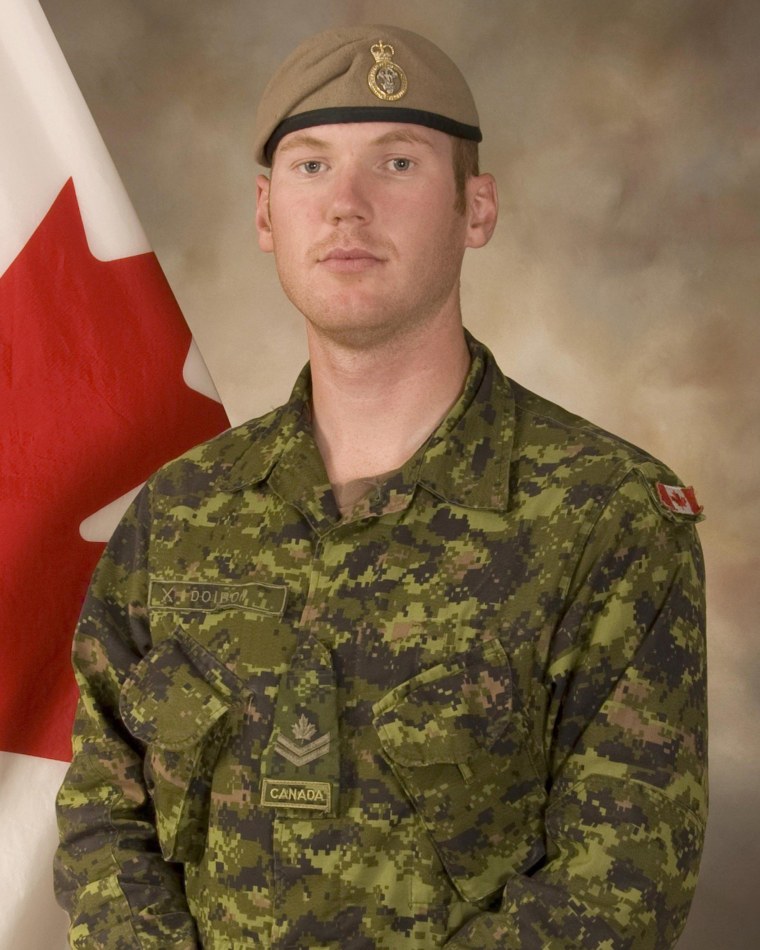IRBIL, Iraq — The Canadian government and Kurdish officials are publicly disagreeing over the circumstances of a Canadian soldier's death in a friendly fire incident in Iraq.
The death Friday of Sgt. Andrew Joseph Doiron on Friday marked Canada's first casualty as part of the U.S.-led coalition's war on the extremist ISIS group.
Kurdish officials said Sunday that Doiron was killed after he and other Canadian soldiers showed up to the front line unannounced to call in airstrikes.
"They went to the frontline to direct airstrikes because the area was attacked by ISIS the day before," Hezhar Ismail, director of coordination and relations for the peshmerga, the Kurdish fighters, told The Associated Press, using an acronym for the Islamic State group.
Canadian Defense Minister Jason Kenney responded to allegations Sunday that Canadian soldiers were on the front line in an interview with CTV, saying that Canadian soldiers were well behind the lines when the soldier was killed. Kenney said the soldiers had just returned to an observation post behind the front line when they were mistakenly fired upon by Kurdish fighters.
"They weren't on the front line," Kenney said. "It was 200 meters from the front."
The Canadian military also denied that the group was in the area to direct airstrikes.
"I can confirm it's a big no. They were not there to conduct airstrikes," said Daniel Lebouthillier, a spokesman for the Canadian military.
Kenney said he looks forward to hearing more after an investigation is completed.
"It's a regrettable case of mistaken identity. Obviously we want to know what happened," he said.
Canada's military on Saturday announced the death of Doiron, a soldier in the Canadian Special Operations Regiment based at Garrison Petawawa, Ontario. Three other Canadian soldiers who were wounded in the incident are in stable condition.
Peshmerga spokesman Halgurd Hekmat said Sunday a group of Canadian soldiers showed up unannounced Friday to the village of Bashiq, in Iraq's Nineveh province near the militant-held city of Mosul. The area had seen heavy fighting against Islamic State militants the previous day. "When they returned, the peshmerga asked them to identify themselves," Hekmat told the AP.
"They answered in Arabic, that's when peshmerga started shooting. It was their fault."
Canada has 69 special forces soldiers with Kurdish peshmerga fighters in what the government calls an advising and assisting role. They were sent to help train Kurdish fighters last September in a mission that was billed as noncombat with the elite troops working far behind the front lines.
Canadian soldiers have been helping the Kurdish fighters by directing coalition airstrikes against Islamic State fighters, a role generally considered risky because it means they are close to the battle against the militants. The fact that Canadian special forces have been involved so close to the front lines has stirred controversy in the country, but Kenney said the rules of engagement will remain the same.
The Canadians' efforts complement those of the United States, which has conducted the vast majority of the airstrikes against the Islamic State group. But in their new role, the Canadians are performing a task in targeting airstrikes that so far the U.S. has been unwilling to do. Gen. Martin Dempsey, chairman of the Joint Chiefs of Staff, has repeatedly said the U.S. would consider directing attacks from the ground but that it has not yet done so.
Hekmat added that he doesn't know why the Canadians were there. "I consider it an improper action by the Canadians, and illogical," he said.
Two Kurdish officials later told the AP that Doiron's body was flown to Canada early Sunday following a military ceremony at Irbil International Airport. They spoke on condition of anonymity as they were not authorized to brief journalists.
IN-DEPTH
- Canadian Soldier Killed by Friendly Fire in Iraq
- Canada Joins Battle Against ISIS
- Which Countries Are Doing What in the Coalition Against ISIS
